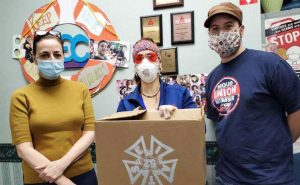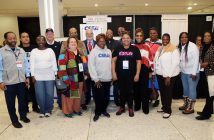
From left, the Guild for Exceptional Children’s Chief Operating Officer Patricia Romano joins CSEA Guild for Exceptional Children Local President Bonnie Diaz and CSEA Contract Administration Specialist Neil Kelly in receiving a shipment of face shields from Shields for Heroes.
As state and local government budget revenues decline and some private businesses are closing, our nation’s economy is struggling to keep afloat while many workers feel uncertainty.
This is particularly worrisome for labor constituency groups, who are now speaking out about the disparities many union members face as the viral pandemic continues.
The Labor Coalition for Community Action, which includes AFL-CIO constituency groups A. Philip Randolph Institute, the Asian Pacific American Labor Alliance (APALA), the Coalition of Black Trade Unionists (CBTU), the Coalition of Labor Union Women (CLUW), the Labor Council for Latin American Advancement (LCLAA) and Pride at Work, is providing a forum for members of the groups to join together to highlight the need to protect working people who are being greatly affected by the pandemic.
Nearly one in four workers is employed in industries that have been affected by COVID-19, including health care, education, retail and food services. According to the U.S. Department of Labor, there are an estimated 67 million workers who risk losing their jobs, including those held by women, non-Caucasian workers and members of the LGBTQ community.
These workers not only hold many of the jobs most at risk, but hold many of the essential, front-line public jobs that have kept our communities safe and running during the pandemic, including custodial, health care and direct care titles.
Non-Caucasian communities endure even further economic disadvantages, with an estimated 8 percent of Black and Latino workers earning below poverty level incomes, compared to just 4 percent of Caucasian workers.
These impacts compound even further when a worker also identifies as LGBTQ. The poverty rates for LGBTQ women, immigrants and non-Caucasians are all higher than the national average.
For Guild for Exceptional Children Local President Bonnie Diaz, the pandemic has merely unveiled what poor, communities of color have known and endured all along.
“There’s nothing new; it’s only been brought to light,” said Diaz. “The lack of access to health care, the low wages that don’t allow essential workers, who are mostly people of color, the privilege of staying home. The exposure is greater for us because we have no choice but to put ourselves in harm’s way.”
Diaz noted how the lack of investment in public services and agencies combined with the initial lack of PPE, excessive mandatory overtime due to short staffing and the overall disregard for the people and individuals who live and work in group homes and other OPWDD and OMH facilities, can all be considered as factors that contributed to the disproportionate impact the coronavirus has had on African American and Latino workers.
“You can’t make a choice when you’re getting paid a minimum wage,” said Diaz. “It’s either my health or my job.”
“This pandemic has proven that working women must stand up and demand a voice at work and have a say in their own future,” said CSEA Erie County Local President Denise Szymura, who also serves as chapter president of the WNY Coalition of Labor and Union Women (CLUW). “Hopefully, when we look back on this time in history, we will be able to measure some progress in this department. We will continue to share resources and raise awareness about the disparities in the workplace and build toward improving outcomes for women in particular.”
CSEA Roswell Park Memorial Institute Local President Paula Love, who is a member of CBTU’s Buffalo Chapter, said people of color are relying on union membership to help them get through these tough times.
“We must ensure that our response to helping our members during this extraordinary time is inclusive and robust,” Love said. “This unprecedented pandemic has proven that our collective well-being depends on every individual connecting with union resources to lift up our working families. Now more than ever, people of color need to reach out to each other and lend a helping hand.”
Diaz called for a united front to avoid a similar fate for communities of color in the future. Whether it’s fighting a pandemic or job cuts, “We need to create guidelines and conditions where we can all stand together, in solidarity,” said Diaz. “Before New York is reopened, we also need to consider those who may be getting evicted and those who don’t have enough money for food.”
— Ove Overmyer and David Galarza






